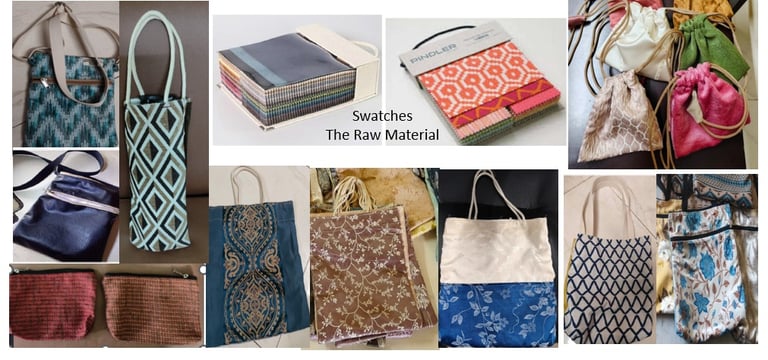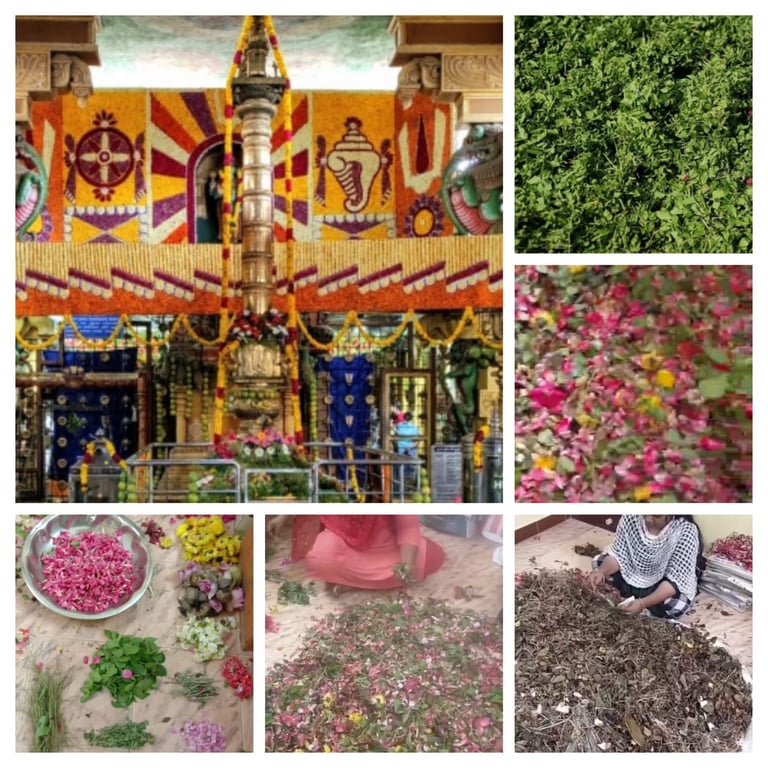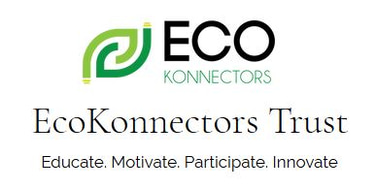HelpHER
Stitching Sustainability and Empowering Lives
India’s textile industry generates massive volumes of waste—much of it hidden in plain sight. Curtain and upholstery showrooms receive hundreds of swatch books each season, filled with small fabric samples for customer selection. These books, once outdated, are discarded in bulk. Made of mixed materials like polyester blends, coated fabrics, plastic sheets bolted into thick cardboard, they are difficult to recycle and often end up in landfills or incinerators. A single mid-sized showroom may discard 50–100 kg of swatches annually, while larger chains exceed 500 kg. Multiply that across thousands of showrooms, and the environmental impact is staggering.
In 2018, a quiet revolution began in Mylapore, Chennai. A group of eco-warriors and women’s self-help groups, under the banner of EcoKonnectors Trust, asked a transformative question: Can we stop this waste from reaching landfills and empower women in the process?
Thus, HelpHER was born—with a mission to HelpHER the Mother Earth and HelpHER the Woman.
The first step was to network with showrooms and encourage them to donate discarded swatch books instead of throwing them away. Volunteers organized pickups using small trucks and stored the material in homes and community spaces. But dismantling these catalogues was no easy task. The fabric was bolted into thick cardboard with iron nails, requiring strong hands to extract. What emerged was a mix of reusable fabric and recyclable by-products—plastic sheets, PP sheets, nails, and cardboard—all carefully segregated and sent for recycling.
Next came the sorting. Volunteers categorized the fabric by texture and thickness. Thick fabric became sturdy sling bags, thinner ones turned into festive thamboolam bags, and sheer fabrics transformed into elegant potlis. As time progressed the product range kept evolving into a larger variety. After this meticulous prep, the material reached trained women tailors who stitched each bag with care and pride.
HelpHER is more than a product—it’s a movement. It replaces plastic bags with upcycled alternatives, delays landfill waste, and creates dignified livelihoods. Women are trained in stitching, upcycling, and sustainable design. With support from NGOs, they access specialized sewing machines to work on the thick fabric aswell and sell their creations at stalls, festivals, and online platforms. Profits are reinvested into expanding training and outreach.
From Independence Day thoranams to wedding gift bags, every HelpHER creation celebrates sustainability. Each bag carries a story—of resilience, creativity, and conscious living. The Women who are a part of HelpHER are not just tailors—they are changemakers supporting families, educating children, and living with dignity.
HelpHER plays a vital role in India’s circular economy. It transforms textile waste into opportunity and empowers women to become innovators and educators. Every HelpHER bag is a step toward saving Mother Earth—one stitch, one swatch, one story.


Nirmalyam
Each day, devotees offer fragrant blooms at places of worship, a gesture of deep reverence and devotion. These sacred flowers adorn deities and fill the space with their divine essence. But what happens once their purpose is fulfilled? Sadly, most temple flowers find their way into garbage bins and landfill sites, mingling with other waste and releasing harmful gases as they decompose. What was once a symbol of purity and devotion becomes part of an environmental concern.
Nirmalyam seeks to change this. With a heartfelt commitment to sustainability, we gently upcycle these divine offerings into meaningful products—ensuring that their sanctity lingers a little longer with you. Through meticulous craftsmanship, we transform temple flowers into Sambrani cones, perfume wardrobe pouches carrying the essence of devotion while embracing nature’s cycle.
Rather than being discarded, these flowers return to the five great elements (Panchabhootas) in their own time, in harmony with nature. Every product is an extension of the divine—a humble step toward sustainability and conscious living.
Join us in giving sacred flowers a second life. Let devotion, purity, and the fragrance of reverence stay with us a little longer, while also honoring the environment.
Preserving Divinity, Embracing Sustainability


